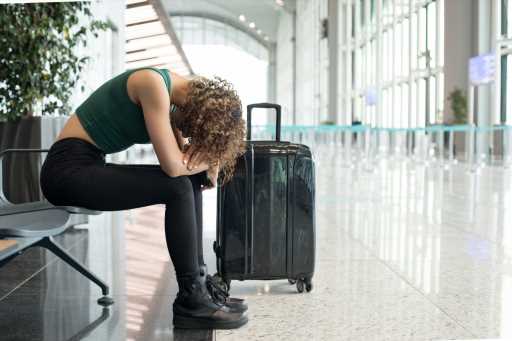It always seems to happen once you’ve booked an amazing vacation, can’t wait to explore your destination, eat all the most delicious local foods, and see all there is to see. But then your stomach starts to feels off. Maybe you feel full even though it’s been hours since you’ve eaten. Maybe you feel bloated, nauseated or, even constipated since you’re not in your own environment. You never feel this way at home. Was it something you ate, or some other factor?
Dr. Michelle Cohen, a gastroenterologist at Mount Sinai New York, says you’re not alone with your stomach issues while traveling. Patients come to her often with questions about travel-related woes.
“In general, I think the most common things that people get are upset stomach, bloated and constipation,” she says. Diarrhea can also occur — you may have heard of traveler’s diarrhea — but it’s usually related to an infection rather than general traveling.
Why does this happen?
There are a few reasons so many of us face stomach problems when we’re on the go, and mostly it has to do with changing what our bodies are accustomed to. “Our bodies are used to a certain type of rhythm and schedule,” Cohen explains. When we travel, we’re eating at different times, sleeping at different times, essentially asking our body to get on a whole new routine.
“That in and of itself can just change the whole dynamic of the GI tract,” she says. Travel, especially by airplane, can also lead people to get dehydrated (I mean, who hasn’t sipped water sparingly so they don’t have to climb over their seat mate ask to get up for the lavatory?), which can lead to constipation.
More: What to Do If You Get Sick While Traveling
These two things — a change in schedule and dehydration — are the main culprits, according to Cohen. It certainly doesn’t help that people who travel are often eating differently than they do at home. Whether it’s eating more carb- and fat-heavy foods or eating larger portions than normal, our gut is thrown for a bit of a loop. That can lead to constipation and other GI upset too. Cohen adds, “It kind of shifts the system.”
Sometimes you can experience what’s called traveler’s diarrhea, which reports say affects 40 to 60 percent of travelers. Some cases are due to bacteria from food or water that causes illness, and may take a few days of your trip to recover from.
What can you do?
So, are your vacations doomed to gastrointestinal distress forever? Not necessarily. Cohen says there are several steps you can take to relieve the most common symptoms.
First, it must be said that if you’re already on a regimen to help alleviate constipation and bloating at home, continue that when you travel, she said. “You shouldn’t just stop because you’re going away,” she notes.
More: Can Using a Fitbit Have a Long-Term Impact on Your Health?
If you don’t have gut issues at home but do when you travel, Cohen recommends getting ahead of the issue. Before, during and after the trip, drink more water and eat more fiber-rich fruits and vegetables. Apples, bananas, and nut bars with good fiber content can make great travel snacks, she says. If you mainly struggle with bloating, try not to eat larger portions than usual at mealtimes. If you’re still having issues, look for herbal options. “Peppermint, ginger, [and] fennel are helpful for bloating,” she says. Look for foods or drinks that contain them.
Exercise can also be key, especially if you’re already active at home. “Just like your heart needs exercise, your colon needs exercise,” Cohen explains. Between long flights or car rides and a packed itinerary, it can be easy to let movement go by the wayside. But you don’t have to do an intense workout routine to help relieve symptoms, she adds. Even a long walk can help to get the colon moving.
More: Self-Care Retreats to Help You Recharge
Still feeling uncomfortable? “If they know they get really constipated and diet isn’t enough, then sometimes I make sure they bring a gentle over-the-counter either fiber or laxative to have in hand in case it starts happening,” Cohen says. She recommends that her patients take a fiber assist or gentle laxative as soon as they start feeling symptoms rather than waiting until the problem is making them seriously uncomfortable.
If you’re prone to get traveler’s diarrhea, or are headed to an area where this can be common (such as Latin America, Southeast Asia, and the Caribbean), it would benefit you to take a probiotic before and during your trip, and drink bottled water once you get to your destination as much as possible.
Ultimately, you should feel free to enjoy your wanderlust to the fullest, delicious local food included. Just give a little love to your gut along the way.
Before you go, check out these ways to stay hydrated during your trip:

Source: Read Full Article

